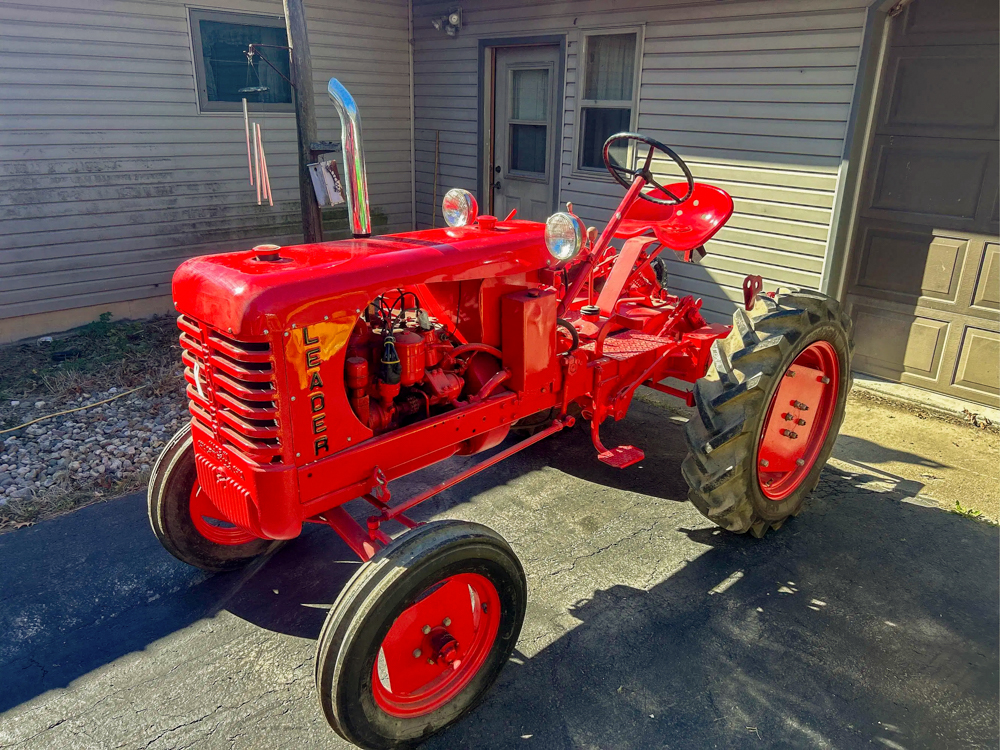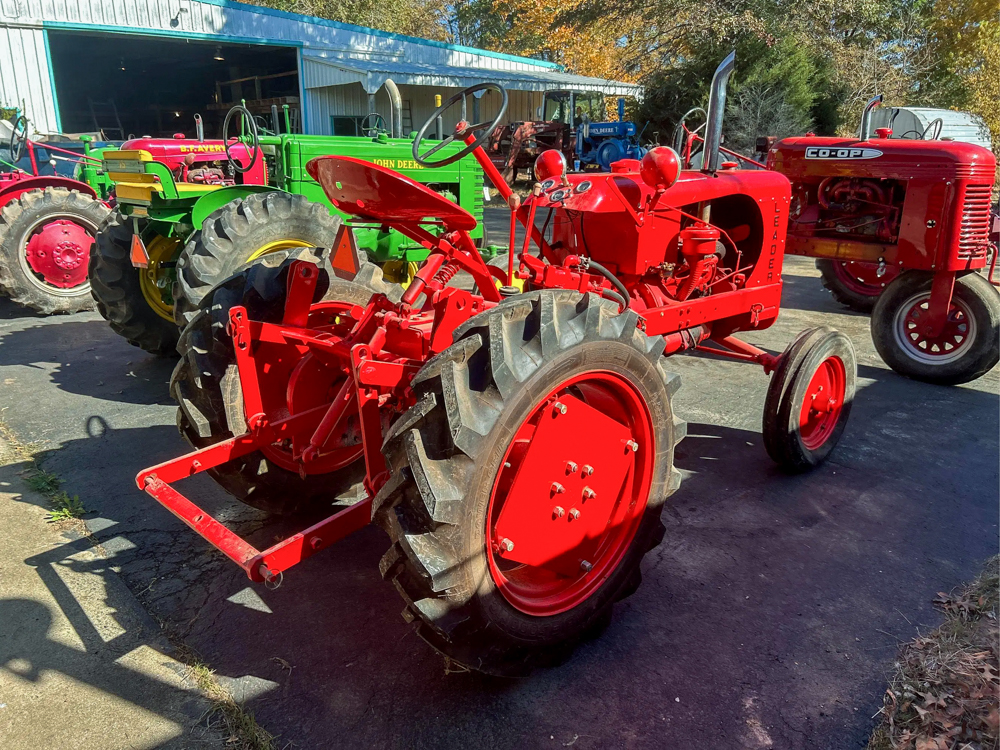Leader Model D: Little tractor, big lesson.
Dec. 04, 2024 • Interesting IronNope, it’s not a Farmall Cub. It sort of looks like one from a distance, but it’s not. This little fella is an Ohio-built tractor called the Leader Model D! I think they’re neat, and there’s a nice one coming up on an online-only auction in east-central Illinois! Leader is a company that has kind of an interesting story, but with a real weird ending.
It all started in a repair shop in north central Ohio back in the 30s. Let’s get into it, shall we?
A Leader emerges…
(I’m going to try to keep the puns and dad jokes to a minimum, but I make no promises.)
Lewis and Walter Brockway were a father and son team who farmed together and ran the local repair shop in Auburn, OH. At some point in 1937, they began noodling on an idea for a garden tractor, which they put into production shortly thereafter. Local response was good, and they reportedly moved about 20 of the little Chevrolet-powered tractors a year under the American Garden Tractor Company name. However, in 1940, the Brockways changed the name of the company to the Leader Tractor Company. Most Leader tractors in the early 40s were Chevy-powered. However, they built about a dozen tricycle front Model A tractors (their first with an actual model designation) that were powered by a Chrysler inline six. I’m told that at least one has survived, but I’m not sure where it is.
Growing pains
At some point in 1945, though, the supply of Chevy power kind of fizzled out. If I had to guess, it was likely because of the war. Undeterred, the company pivoted to Hercules powerplants for a new tractor, the Model B. Hercules flathead fours were reliable, fairly similar in size and weight to the Chevy, and most importantly…they were available. You’ll find that quite a few other little tractors built in the 40s used the same 31-horse IXB-series engines, so it was no surprise that Leader followed the crowd. (No pun intended.)
Business was good, and word was starting to spread as more and more Model Bs were spotted on farms in the region. To help with name recognition and marketing, in 1946 the Brockways began casting “Made in Auburn, Ohio” into the lower portion of the tractor’s nose. The one thing that they didn’t take into account when building the grill, though, was that Auburn didn’t have a post office! This led to a problem with mail that never got delivered!
Ultimately, they solved the problem when they released the Leader Model D in 1947. As I understand it, it was virtually identical to the outgoing Model B with one major difference. The cast iron grille was reworked a little, stating that the tractor was built in Chagrin Falls, OH a few miles up the road.
Why the change? Easy. Chagrin Falls had a post office, and the mail carriers knew where Leader was!
Sometimes complex problems require simple solutions!

A lesson learned the hard way…
It was about the same time frame that the Brockways partnered up with Walter Schott. Schott was an enormously successful businessman who, among other things, owned the biggest chain of car dealerships in Ohio. They started handling all of the marketing for the Leader Model D when it launched, and things seemed like they were going well. Demand had grown enough that they needed to expand!
That was where Walter & Lewis Brockway made an error, one that would ultimately put them out of business. See, they borrowed money from Walter Schott for the expansion. And buried in the legalese of the contract was a pay on demand clause…that they never caught.
Ultimately, this was the company’s downfall. Walter Schott called the note due in 1948. When the Brockways couldn’t pay up, they had no choice but to forfeit the company. To add insult to injury, Schott had closed down the company within two years – and it was a complete shutdown, too. He liquidated everything that wasn’t nailed to the walls, and destroyed the records.
Was it a hostile takeover? Honestly, I don’t know. It sure looks like it on the surface. However, it also seems like Walter Schott had a pretty solid reputation as a businessman, so I’ve always been pretty curious about what really happened?
That all said, though, the story of the Brockways and the Leader Model D reinforces a very strong lesson for everybody. ALWAYS READ THE FINE PRINT!
And maybe don’t start a company in a town without a post office.
Anyway, what about the Model D on Trent Schmid’s upcoming auction? Let’s take a look!
The Leader Model D you can bid on right now…

I called Trent Schmid, the auctioneer handling the sale, to see what he knew about the Leader Model D on the sale. He didn’t know much about that tractor, but he did tell me a few things about Gene Hargis, the man who owned it.
After serving our country in the Korean War, Gene Hargis came back home to his wife Doris and farmed his family’s ground a bit east of Oblong, Illinois. Not long after that, he began collecting tractors and equipment related to agriculture…and he collected a LOT of it! Trent says that this is the first of three sales that Schmid Auction will hold for Gene’s estate, and if they’re all as big as this first one, he must have had a ton of stuff! In addition to a fascination with tractors, Gene also collected a hit and miss engines as well as a lot of equipment related to horses (buggies and the like).
One of the things Gene loved most was being involved in several tractor clubs. I get the impression that he was a Deere guy at heart, because he was active in several 2-cylinder clubs in the area, and he served as director of the Oblong Antique Tractor & Engine Club for years. At the end of the day, I suspect he and I would’ve gotten along pretty well!
What’ll it sell for?

Leader tractors are in a pretty unique spot in the collector’s market these days. While I wouldn’t go so far as to say that they’re super-rare, they’re not real common, either. When Walter Schott shuttered the company in 1950, they destroyed the production records, so nobody really knows how many Leader tractors were built. The Model D was their most successful model, so those will be the ones that you’ll see most frequently.
The beauty of these little machines are that they’re simple tractors. Nothing is real complex. Engine parts aren’t hard to find because Hercules made a bajillion IXB-series motors and a lot of the different variations swap interchangeably. Sheet metal might be tougher to find, but on the whole, these things aren’t difficult to fix up. I did see a complete set of skins and a grille on this auction, in case anybody’s looking.
Lastly, they’re pretty darn affordable. I’d be surprised if you couldn’t pick one of these up for a couple thousand bucks. I watched one sell at a Mecum Gone Farmin’ auction a few years ago that was absolutely perfect. Even then, I think it barely cleared $4000 even after commissions and fees.
Wrapping up…
At the end of the day, it might never be a cornerstone in anybody’s collection. Even though it was a well-built, high-quality tractor, a Leader Model D will probably never carry the collector cache of the major brands. However, it’s a great example of one of the many smaller brands that helped build this great country we live in! It’s also a great reminder as to why it’s so important to read the fine print! It’d be a great first tractor for somebody’s collection, and that’s where I really hope it goes!
Here’s the link to that tractor one more time.
1948 Leader Model D
Recent Posts
See AllTractor Zoom is connecting farm equipment sellers and buyers faster than ever before. Finding farm equipment at auction or at a dealership has never been so easy.
